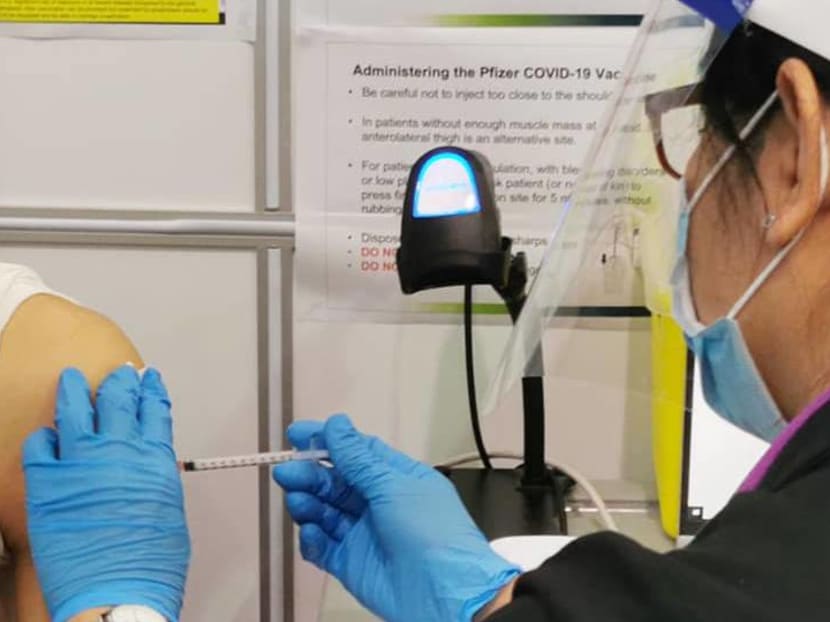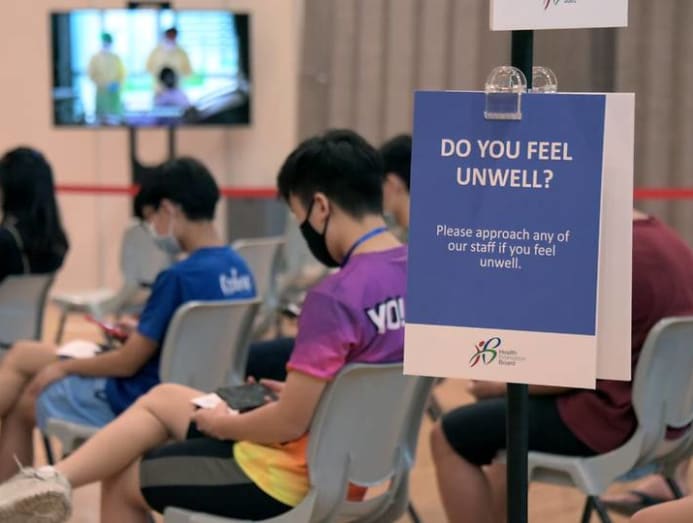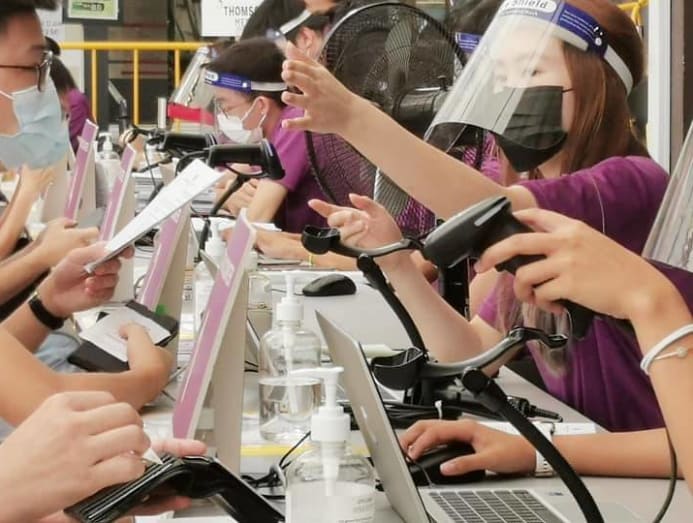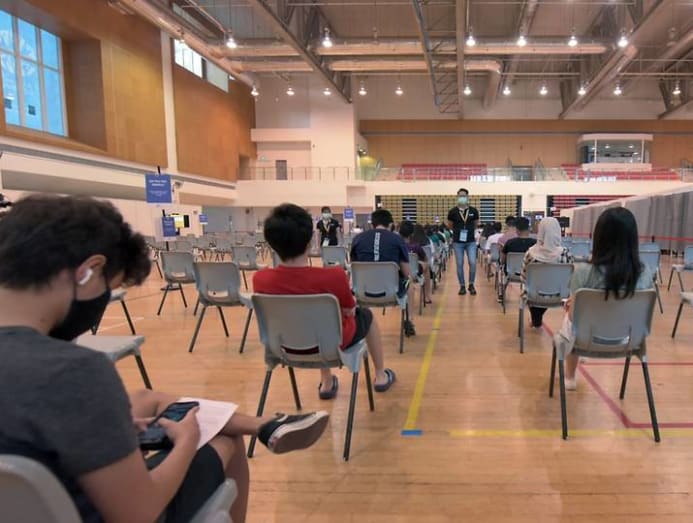Side effects, infection risks and post-COVID-19 school life: Tackling vaccine concerns for kids
Talking Point host Steven Chia finds out just how safe, or necessary, the COVID-19 vaccine is for children, as well as what inoculation might mean for students going forward.

A student receives a shot at a COVID-19 vaccination centre for students on Jun 3, 2021. (Photo: Facebook/Ministry of Education)
SINGAPORE: He went online, did his research and felt “pretty safe” letting his 15-year-old daughter be vaccinated against COVID-19.
But what seemed a “no-brainer” for Talking Point host Steven Chia may not be so for some parents.
In a straw poll he conducted via CNA Insider’s Instagram account, 23 per cent of the 300 respondents said no to vaccinating their children.
Shaheera Effendi, for example, is “still thinking” about whether to bring her elder daughter, 13, for vaccination.
“She tends to get sick very easily, so I’m quite worried … she’d have worse side effects,” said the mother of two, who cited the rare cases of heart inflammation in teen vaccine recipients being investigated in some countries.
She also has friends who have questioned whether children need a vaccine to fight the novel coronavirus.
WATCH: Should my child get vaccinated for COVID-19? Common vaccination questions parents have (5:10)
Among parents who have had children vaccinated with their first dose, there were also initial apprehensions. One of them, Daniel Teo, said he ultimately thought of the “good effects” instead of side effects like fever, headache and a sore arm.
“Once you’re vaccinated … even if you have (COVID-19), you probably won’t fall so sick,” cited the father of two teens. “It’s an added protection.”
Patricia Ng is another who “thought hard about it” before making her decision. “There might be long-term effects, but … that’s unknown, right?” said the mother of three girls aged 13 to 20.
“What’s known to me is, if my kids get COVID-19, their health would be greatly compromised. And that’s not a chance I want to take.”
So far, the Pfizer-BioNTech vaccine is the only one in Singapore approved for those aged 12 to 17. As with adults, they must declare any known allergy and whether they are on certain medications before they can be cleared for vaccination.

Notwithstanding precautions like these, Mr Chia could “understand why there might be some concerns” among parents. So he spoke to some experts about just how safe, or necessary, the vaccine is for children.
He also found out from Education Minister Chan Chun Sing what inoculation might mean for school life going forward.
READ: Singaporeans aged 12 to 39 can register for COVID-19 vaccination from Jun 11
READ: Singapore shortens interval between COVID-19 vaccine doses to 4 weeks
KEEPING A LOOKOUT
One of the concerns Mr Chia heard from parents is that the vaccines “came about so quickly” compared to traditional vaccines, which take years to come out.
But the technology behind the messenger ribonucleic acid (mRNA) used in the Pfizer-BioNTech vaccine “has been around for decades”, said senior consultant Thoon Koh Cheng, who heads the infectious disease service at KK Women’s and Children’s Hospital.
“We’ve used it in many other conditions such as in cancer,” he noted. “Given those experiences and also the trials that were done … it’s been deemed to be reasonably safe, with the side effect ratios within acceptable limits.”
He acknowledged that “there’s always a concern whenever anything new is introduced to our growing children”. But the available evidence suggests that the vaccines — which act like a set of “coding instructions” for the body — “don’t change our DNA”.
“(The mRNA instructions) are also rapidly destroyed by our enzymes, and then they’re discarded. So within that time frame, it’s very unlikely that we’ll see long-term side effects … in the vast majority of children who are vaccinated,” he said.
READ: Benefits of mRNA COVID-19 vaccines ‘continue to outweigh’ risks: Singapore expert committee
Associate Professor Thoon, who has done research on adverse effects following immunisation, said Singapore has also been “carefully evaluating” the presence of heart inflammation in young adults and adolescents — and “there’ve been some signals, but they’re also very, very small”.
From data overseas, the reported rate so far is 1.6 per 100,000 adolescents vaccinated, he cited. “Most of these reports have mentioned that these individuals have recovered without any long-term side effects, and they’re still on follow-up.
“If we do detect the signals, we’d also pause and take stock (of) whether or not these are important enough for us to change direction.”

For children in Singapore who have been infected with the virus, none have required intensive care, and “they seem to have more asymptomatic infections compared to adults”, noted Chan Si Min, the head of paediatric infectious diseases at National University Hospital’s Khoo Teck Puat – National University Children's Medical Institute.
Having treated children with COVID-19 since the outbreak began, the senior consultant sees that some of them, however, are at higher risk of having the kind of severe infection some adults have had.
They include infants less than a year old, teenagers over 12 years old and children with underlying medical conditions.
There is also the risk posed by Multisystem Inflammatory Syndrome in Children, which is related to COVID-19 infection. It may even strike children who were asymptomatic during their original infection.
“They’ve recovered from (COVID-19), and one to two months later, they develop the syndrome of high inflammation in many parts of their body,” cited Dr Chan.
“More than half of them end up in intensive care. And about 2 per cent of them will die from the syndrome.”
Globally, the syndrome tends to affect about one in 1,000 children who have had COVID-19. Singapore and Southeast Asia “haven’t really seen this syndrome yet, but that’s obviously something we’re (keeping) a watch out for if more children develop COVID”.
These risks are not the only reasons for vaccinating children, she added.
“If you want your children to get back to some kind of normalcy, especially for … children to congregate in classrooms and tuition centres and sports, then it would be good to have them vaccinated.”
READ: Will taking a painkiller before the jab help? Your COVID-19 vaccine questions answered
LOOSER MEASURES IN SCHOOL?
As at June 27, more than 112,000 children in Singapore aged 12 to 15 have got their first dose of the Pfizer-BioNTech vaccine.
Marleen Toh, 13, is one of them, and she hopes that “if everyone in school is vaccinated”, then they can remove their masks during physical education.
That is “one of the possibilities” scientists are studying, especially for open-air environments, noted Mr Chan.
“That’s perhaps less risky compared to … a closed environment where the virus might circulate a bit more,” said the education minister, who signalled that it might be “one of the first steps” to take when COVID-19 measures can be loosened.
“We definitely want to keep an open mind, but at the same time we must make sure that we’re able to adopt a whole suite of different measures according to the different mutations that might happen.”
Group activities are now not allowed. But “if more people get vaccinated and if the science allows us to do this, we’d want you to go back to the small groups where you collaborate with one another”, he said.
While things will still be “quite different” from school life before the pandemic, “if we’re all vaccinated, that would give us greater confidence to interact … during playtime, during recess or during other lessons that are conducted in the open air”.
“For the cohorts that can be vaccinated, we hope that all of them will be vaccinated as soon as possible,” he said, adding that the rest of the safe management measures will continue to apply to younger cohorts.
“I don’t think we’ll be able to get rid of all the safe management measures, but we may be able to adjust … as we go along, based on our vaccination rate and based on the variants of concern.”

To parents who may feel pressured to have their children vaccinated, he stressed that “regardless of whether your children have been vaccinated or not, we must take care of all our children together”.
“Some children may not be able to get vaccinated because they have other medical conditions, so we fully understand that,” he said.
“But to the extent that … children can be vaccinated, of course we hope that the parents will get the necessary information to make an informed decision.”
He understands that “some parents might have some concerns” over potential short-term or long-term side effects.
“As a parent, what I’d usually encourage other parents to think about is this: In the short term, if we’re vaccinated, the chances of us getting seriously ill and requiring … intensive care are much reduced,” he said.
WATCH: The full episode — COVID-19: Should our children be vaccinated? (22:30)
From what Mr Chan has seen, the numbers “aren’t very different” in terms of potential side effects for children and for the entire population.
Giving parents such information, however, is “only the first step”, he noted. “The second step is to make sure that as the children go through the vaccination programme, whatever help … they need they’ll get it.
“This is what we’ll continue doing … for the second dose in a couple of weeks’ time.”
For Mr Chia, whose daughter will get her second jab after a six-week interval, the benefits of vaccination “far outweigh” the risks.
“We should also all consider the possible ways we can loosen restrictions if more of us get vaccinated,” he said. “That’s one way we can give our kids back their childhood.”
Watch this episode of Talking Point here. The programme airs on Channel 5 every Thursday at 9.30pm.







